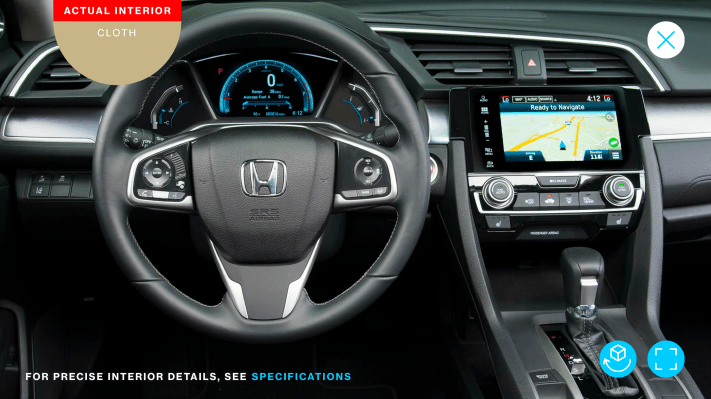The car leasing and rental market is forecast to be worth $124 billion in 2022, and today a startup that is hoping to get a piece of that action by making the process of leasing a car easier is announcing a Series A in its effort to get there.
Honcker — a New York-based startup that acts as an aggregator and search engine for leasing services, and platform for would-be customers to consolidate their data and application process in one place — has raised funding from IAC, the media and marketplace giant behind services like Angie’s List and Tinder, as well as Daily Beast and Vimeo.
Along with the funding, Honcker is releasing a new version of its app with more parameters to search for vehicles and get recommendations, a facility to break or extend leases and add co-signers to leases if needed.
Honcker’s new round comes in the form of a Series A and Honcker is not disclosing many details, but from what we understand the value is around $15 million — a relatively modest amount when you consider that Fair, another hopeful in the flexible ownership/leasing business, has secured up to $1 billion in debt and hundreds of millions in equity investments, plus some acquisitions, for its efforts.
Honcker’s path to growth is a little different, coming on a more modest funding base and with a different structure. Since raising a seed round of $3.6 million in October 2017 from Lead Edge Capital and Evolution, the company has had some interesting traction.
The company, founder and CEO Nathan Hecht told me, is focused on leasing new cars only and working with existing dealerships rather than holding the inventory itself (which is one way of keeping down costs). Today there are over 250 on the platform across eight states, including Arizona, California, Florida, Nevada and New York.
Because of its connection to existing car leasing companies, who ultimately hold a customer’s contract, Honcker’s users also typically follow the general leasing schedule, which is typically around 36 months, although Hecht says it’s getting shorter, and the breaking/changing option in the new app should also influence that.
The company has been growing 25 percent month-over-month in terms of transactions on the platform, and has up to now grown with almost no marketing spend and by word-of-mouth.
Honcker got its start, Hecht said, when he was working on a different startup (interestingly, another one based on temporality but of a very different kind: Dstrux was designed to create messages for different social media platforms that would self-destruct).
“I walked into a car dealership to try to lease a car,” he said. “I sat there a whole day but still went home without a car.”
He said he discovered a lot of shortcomings. The process was not only laborious, but didn’t favor the kind of choice that consumers want to have today: you had to know what car make you wanted from the start, but what if you were searching for a minivan and were open to different makes and models?
Hecht also noticed that there were no decent leasing search engines online, in the way that there are for shorter-term car rentals. “And I couldn’t get a monthly payment on the lease, they wanted additional credit applications and more in what turned out to be a long process of choosing vehicle and figuring out the paperwork.”
He said he left the dealership and reconvened with his team and got them to agree to pivot.
There is a clear opportunity to improve the leasing experience these days, and in the future. Many are questioning whether outright car ownership will be as palatable in a future where there are other transportation alternatives, and autonomous and other smart vehicles become potentially too cost-prohibitive to own.
But even if, as Hecht claims, the leasing market is the fastest growing segment of the new-car market right now, itself worth $160 billion in his estimation (that is, higher than the figures I quote at the start of this article from a research firm) that doesn’t mean that all companies going to to try to fix this now are hitting home runs. Among the many that have stumbled have included Beepi, Evercar and Breeze.
Hecht believes, however, that if you run the company “very lean” and stick to a specific goal without rampant expansion and over-leveraging with too much inventory, it’s possible to find success.
And it seems that IAC agrees. The larger firm has been an investor in startups with mixed success. One of its big bets, the TV startup Aereo, was shut down by regulators (but IAC isn’t giving up: it’s also backing Starry from the same founder). On the other hand, it’s had a wild run so far with Tinder, which was wholly funded and incubated by IAC.
Although IAC has a lot of first-hand experience in two-sided marketplaces in its own stables, this is the first time it’s getting involved (via this minority stake) in a car marketplace. Automotive, however, seems to be something it’s getting more interested in, perhaps feeling a little left out of the huge growth of Uber and Lyft. Last year, it also invested in a Series B for trucking startup Convoy, which is also backed by Y Combinator, Greylock Partners, Jeff Bezos and more.
The company has set itself a goal of getting involved in more of these kinds of opportunities to tackle new markets. “This year we will look to plant the seeds for future growth through the acquisition of smaller, earlier stage assets and to incubate opportunities both inside and adjacent to our existing businesses,” IAC CEO Joey Levin wrote in his shareholders’ letter earlier this month.
